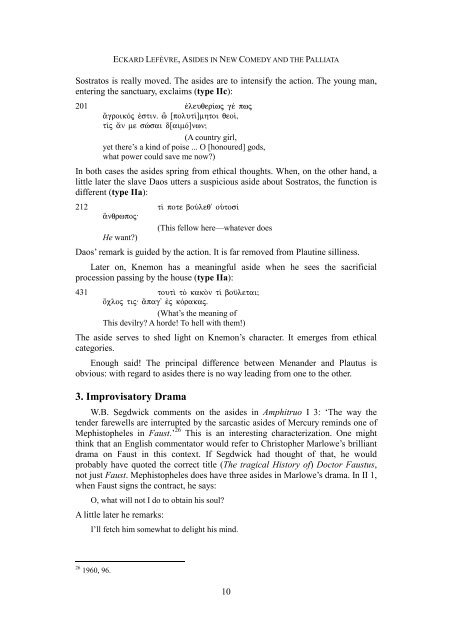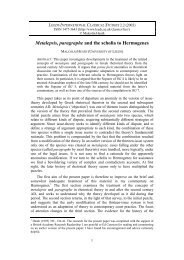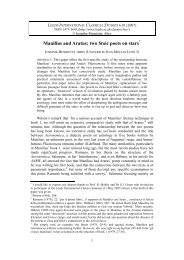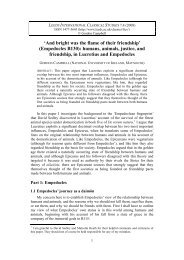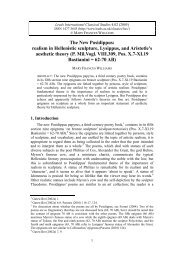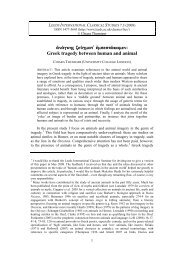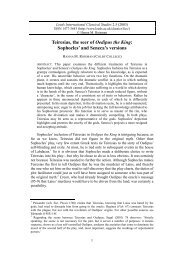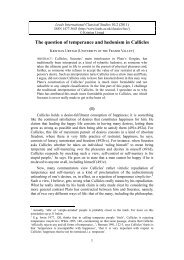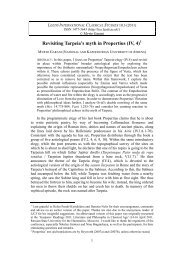Asides in New Comedy and the Palliata - Leeds International ...
Asides in New Comedy and the Palliata - Leeds International ...
Asides in New Comedy and the Palliata - Leeds International ...
Create successful ePaper yourself
Turn your PDF publications into a flip-book with our unique Google optimized e-Paper software.
ECKARD LEFÈVRE, ASIDES IN NEW COMEDY AND THE PALLIATA<br />
Sostratos is really moved. The asides are to <strong>in</strong>tensify <strong>the</strong> action. The young man,<br />
enter<strong>in</strong>g <strong>the</strong> sanctuary, exclaims (type IIc):<br />
201 leuqer…wj gš pwj<br />
¥groikÒj st<strong>in</strong>. ð [polut…]mhtoi qeo…,<br />
t…j ¥n me sèsai d[aimÒ]nwn;<br />
(A country girl,<br />
yet <strong>the</strong>re’s a k<strong>in</strong>d of poise ... O [honoured] gods,<br />
what power could save me now?)<br />
In both cases <strong>the</strong> asides spr<strong>in</strong>g from ethical thoughts. When, on <strong>the</strong> o<strong>the</strong>r h<strong>and</strong>, a<br />
little later <strong>the</strong> slave Daos utters a suspicious aside about Sostratos, <strong>the</strong> function is<br />
different (type IIa):<br />
212 t… pote boÚleq' oØtos…<br />
¤nqrwpoj:<br />
(This fellow here—whatever does<br />
He want?)<br />
Daos’ remark is guided by <strong>the</strong> action. It is far removed from Plaut<strong>in</strong>e sill<strong>in</strong>ess.<br />
Later on, Knemon has a mean<strong>in</strong>gful aside when he sees <strong>the</strong> sacrificial<br />
procession pass<strong>in</strong>g by <strong>the</strong> house (type IIa):<br />
431 toutˆ tÕ kakÕn t… boãletai;<br />
Ôcloj tij: ¥pag' j kÒrakaj.<br />
(What’s <strong>the</strong> mean<strong>in</strong>g of<br />
This devilry? A horde! To hell with <strong>the</strong>m!)<br />
The aside serves to shed light on Knemon’s character. It emerges from ethical<br />
categories.<br />
Enough said! The pr<strong>in</strong>cipal difference between Men<strong>and</strong>er <strong>and</strong> Plautus is<br />
obvious: with regard to asides <strong>the</strong>re is no way lead<strong>in</strong>g from one to <strong>the</strong> o<strong>the</strong>r.<br />
3. Improvisatory Drama<br />
W.B. Segdwick comments on <strong>the</strong> asides <strong>in</strong> Amphitruo I 3: ‘The way <strong>the</strong><br />
tender farewells are <strong>in</strong>terrupted by <strong>the</strong> sarcastic asides of Mercury rem<strong>in</strong>ds one of<br />
Mephistopheles <strong>in</strong> Faust.’ 26 This is an <strong>in</strong>terest<strong>in</strong>g characterization. One might<br />
th<strong>in</strong>k that an English commentator would refer to Christopher Marlowe’s brilliant<br />
drama on Faust <strong>in</strong> this context. If Segdwick had thought of that, he would<br />
probably have quoted <strong>the</strong> correct title (The tragical History of) Doctor Faustus,<br />
not just Faust. Mephistopheles does have three asides <strong>in</strong> Marlowe’s drama. In II 1,<br />
when Faust signs <strong>the</strong> contract, he says:<br />
O, what will not I do to obta<strong>in</strong> his soul?<br />
A little later he remarks:<br />
I’ll fetch him somewhat to delight his m<strong>in</strong>d.<br />
26 1960, 96.<br />
10


